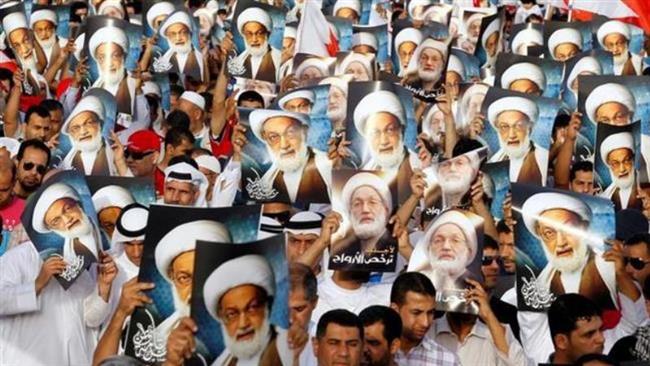The campaigners have issued statements across the Persian Gulf island urging the people to hold even more heated demonstrations and continue the sit-ins staged around Sheikh Isa Qassim’s house since 11 months ago, when the west-back Arab kingdom stripped top cleric of his Bahraini citizenship.
The fresh anti-Khalifa movement aims at providing as much as possible popular cover for the Sheikh Qassim to push back against upcoming restrictions that are expected to be put on the top political and religious figure by the Bahraini authorities once the hearing concludes.
The people in recent weeks responded to the calls for rejuvenated anti-regime rallies, holding them in a majority of the cities of the tiny island kingdom.
The Al Khalifa regime, which also enjoys relentless support of neighboring Saudi Arabia, has cracked down on the protestors with an iron fist as it has done since the beginning of the revolt.
Many arrests have been reported in counter-protest moves of the regime's security forces. There were also reports of considerable number of casualties.
Triggered by the popular groups who seek pressing the government through rallies, the campaign also called for help of the political, academic, and religious circles across the Muslim world. Over the past year, such measures, both on the streets and online, have yielded their results. They appeared effective in precluding the Bahraini rulers from dealing with the revolutionaries in a tougher fashion, and sometimes foiling plots designed by the regime to target the clerics of the country.
The uprising leaders have argued that Bahraini regime has been waiting a chance to practice inhuman intentions against the revolutionary forces and their leaders, particularly Sheikh Isa Qassim. They label the past verdicts or the upcoming ones as politicized, and only meeting interests of the Manama regime.
The Bahraini rulers, and their American and British patrons, are seeking proper conditions to divert the attention to other issues, something they hope will break firmness of opposition against the verdicts of the judiciary. However, so far no measure or incident have positively served this aim and led to retreat of the public that is insistently backing the religious leader.
The past year’s record shows well that round-the-clock popular gatherings outside the house of Ayatollah Qassim as well as the demonstrations across the country in solidarity with him have played a crucial role in deterring the Al Khalifa regime’s tough-handed measures against the voices of dissent. The deterrence of the demonstrations has been doubled as other countries held protests to show support for the spiritual leader. Actually, the rallies in Bahrain have stirred global activism against disrespect to the Muslim clerics.
Amid this atmosphere, it looks unlikely that the Bahraini rulers take measures that will risk expansion of range of protests, and even render unexpected steps by the opposition. If the kingdom takes the risk, it should possibly expect any scenarios in the future, including turmoil and even armed actions by the opposition against the establishment.
Any moves against the leader of the uprising will actually further widen the gaps between regime and opposition, and will risk allowing the revolution to upgrade to a new stage, perhaps a mutually violent one.
Aside from the perils of the future, there is a global movement growing bigger in solidarity with the Bahraini revolution. The pro-uprising movement is an outcome of the Bahraini people's resistance at home and activism led by rights groups around the world. If it succeeds in thwarting unfair verdict for Ayatollah Qassim, it will count as a triumph for the Bahrainis and the Muslim world as a whole. Its effects will be crucial and safeguard the Islamic circles and clerics against any risks for long years.
/106

